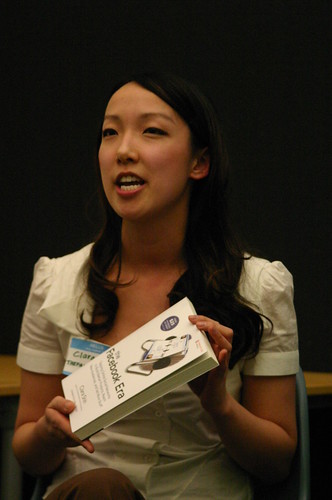Today, I spoke with Clara Shih, who is the author of The Facebook Era and a Salesforce.com employee. In this interview, she discusses what the Facebook era is, how she came to write the book, what social networks mean for personal branding, and more.
What is the Facebook Era?
The Facebook Era is the technology, business, and cultural transformation in people’s behavior, relationships, and expectations sweeping across the internet thanks to widespread adoption of social networking sites such as Facebook.
The previous Internet Era was marked by the World Wide Web of information and the power of linking content. The Facebook Era is defined by the World Wide Web of people emerging across sites like Facebook and Twitter, and the power of trusted online identity and knowing who is connected to whom and how. The implications are vast, affecting nearly every aspect of our personal and professional lives.
How did you come to write The Facebook Era, and what is your personal brand?
Writing a book was serendipitous in my case. I am not a career author — I am a technologist and entrepreneur who decided to bring together the enterprise and social web. When Facebook launched its development platform in May 2007, I wondered why there were no business applications, so I built the first one. Faceconnector (originally called Faceforce) integrates Facebook profiles and friend information into Salesforce CRM. It was a simple idea, but helped kickstart the enterprise social movement.
Soon, I found myself talking with organizations of all sizes and industries using my app. Their stories about how Facebook is transforming their businesses were fascinating. I wrote The Facebook Era to capture this history in the making and share best practices, insights, and a vision for the future of the Web with others.
What do social networks like Facebook mean for personal branding?
Social networks have become necessary and powerful for personal branding. Necessary because the default action now for learning about someone is looking them up on Facebook and Linkedin. Having no presence or worse yet an unprofessional one on those sites is a quick way to be written off.
Social networks are powerful for personal branding for a few important reasons: trusted identity, social validation, and forum for broadcasting information.
- Trusted identity: Social network profiles provide a trusted and widely agreed upon template for communicating your brand — for example, your photo, employer, school, interests, and hobbies. Before, putting this information on your website, email signature, or other communication seemed narcissistic. Now it’s socially acceptable to share this widely.
- Social validation: Social networks provide opportunities for social validation, such as public recommendations on Linkedin and comments/wall posts on Facebook. Before, testimonials and communication between two individuals were largely private. Now, they are largely public.
- Forum for broadcasting information: Social networks starting with Facebook created a distribution channel for broadcasting news and updates about individuals. To effectively establish a personal brand, you need reach.
How should we think about social networking vis-a-vis traditional social media like blogs and wikis? Do the branding opportunities differ across Facebook, Linkedin, Twitter, and other networks?
The single most important difference between social networking and earlier social media is the emergence of personal online identity. Before social networks, social media was effectively interaction among strangers. With social network profiles, you can start to get to know the person behind the name. Seeing someone’s photo and interests makes the person seem real. Discovering mutual friends builds “transitive rapport” and trust. But Facebook doesn’t replace blogs, wikis, and other communities. It augments them with trusted identity and the social graph.
The different social networks themselves espouse different branding. Having a profile on one or the other contributes to your brand. Facebook started out for college kids but has become mainstream, even expected. My friend Larry (half-) jokes that if he can’t find you on Facebook, you don’t exist to him. He has a crazy schedule as a medical resident and relies on Facebook to manage much of his life and relationships — so if you don’t have a presence there, he may forget you. Linkedin is for business professionals and more of a transactional versus  engagement site. Twitter is the cool, new up-and-comer best for communicating with strangers whom you may not reciprocally follow. MySpace has largely been branded for musicians and entertainers.
engagement site. Twitter is the cool, new up-and-comer best for communicating with strangers whom you may not reciprocally follow. MySpace has largely been branded for musicians and entertainers.
What do people need to watch out for on social networks?
Privacy is an important one that requires careful planning. People need to think carefully about what they want to share with whom. It’s a good idea to take some time out and tier your contacts using Facebook friend lists so you can actively manage privacy settings for each group. At an extreme, there are even a rising number of cases of identity theft and other examples of malicious data mining. At some point, there is a tradeoff between privacy protection versus establishing and broadcasting your personal brand which requires ongoing attention and management.
——
Clara Shih is the author of The Facebook Era. She joined Salesforce.com in 2006 and is responsible for Social Networking Alliances & Product Strategy, including the company’s formal partnership with Facebook. Previously, she was the product line director of AppExchange, salesforce.com’s online business applications marketplace, for which she led the development of the Checkout payment services for partner applications. Independently, Clara is the creator of Faceconnector, the first business application on Facebook. Faceconnector integrates Facebook profiles and friend data into Salesforce CRM. Clara is a frequently invited speaker on social media at global conferences including Web 2.0 Expo, Enterprise 2.0, Toronto TechWeek, and Social Ad Summit. Clara has held positions at Google and Microsoft, and holds degrees in computer science, economics, and internet studies from Stanford and Oxford, where she studied as a Marshall Scholar. Follow her on Twitter @clarashih.






